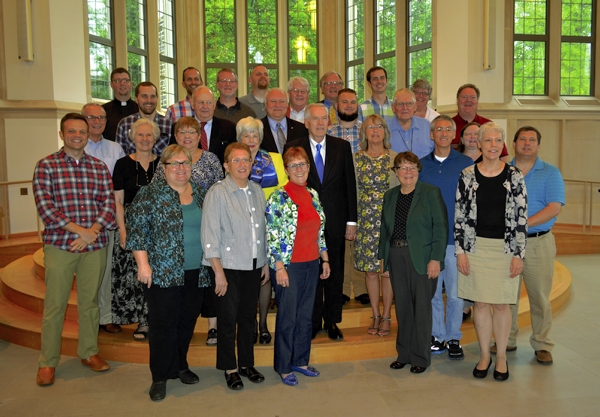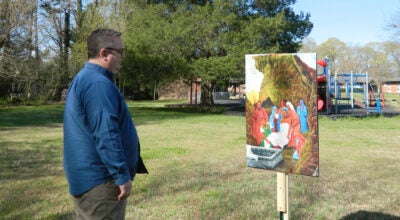Vocation to Preach
Published 12:00 am Saturday, September 24, 2016

- A group of area Lutheran pastors surrounds Dr. Richard Lischer (center, wearing blue tie), who was honored Monday at Duke Divinity School during a seminar, “A Vocation to Preach."
By Susan Shinn
For The Salisbury Post
DURHAM — More than a dozen area Lutheran pastors attended “A Vocation to Preach,” a seminar hosted Monday by Duke Divinity School.
The purpose of the event was two-fold: to address the myriad challenges clergy face, and to honor the numerous contributions of Dr. Richard Lischer, a longtime professor of preaching, Lutheran pastor, and author, who retired this summer after 37 years at Duke.
The seminar was an expansion and examination of Lischer’s words, “In a new and challenging world of communication, the preacher is called to rely on the Word of God and, by the leading of the Spirit, to tell the truth about human sin and divine redemption. It is a hard vocation. No wonder the Apostle asks, ‘Who is sufficient for these things?’”
The free event was a draw for a group of Lutheran pastors from throughout the Piedmont, several of whom are serving in their first parishes.
“The seminar features names I know and appreciate,” said the Rev. Micah Kearney, a Salisbury native who’s pastor of Holy Comforter, Belmont. “It’s engaging, low-cost, and I also came to enjoy fellowship with my fellow pastors.”
The Rev. Sean Barrett, pastor of St. Peter’s, Salisbury, was invited by friends.
“These speakers are rock stars for preachers,” he noted.
Dr. Thomas Long, the morning’s first speaker, talked about “The Rhythm of Ministry,” and how the letters of St. Paul to Timothy and Titus — the Pastoral Epistles — serve as a sort of guide book for pastors.
“They are not sweeping panoramic statements of the faith, like Romans, nor are they … poetically rich expressions of the fullness of God’s overwhelming grace, like Ephesians,” Long said.
Rather, they are “manuals for ‘first responders,’” he said, for real pastors doing real ministry.
They offer counsel, direction, wisdom and encouragement, he said. These books are not about singing the “Hallelujah Chorus” on Easter, he said. “They are more about humming ‘Precious Lord, Take My Hand’ as a pastor tries to figure out how to live and bear witness to the gospel in places where the church is off the rails, where there are worship wars, weak leadership, sagging attendance, biblical and theological ignorance, and petty bickering.”
Long used the verses from 2 Timothy 2:9 to illustrate the cyclical, up-down, “A-B nature” of ministry, “Remember Jesus Christ, raised from the dead (A), a descendant of David (B)—that is my gospel (A), for which I suffer hardship (B), even to the point of being chained like a criminal. But the word of God is not chained (A). Therefore I endure everything for the sake of the elect (B), so that they may also obtain the salvation that is in Christ Jesus, with eternal glory (A).”
He concluded that “the rhythm of ministry dares to preach and live the resurrection in the shards and fragments of ministry in turmoil of a world passing away,” into the new world that is to come.
The Rev. Matt Smith has been pastor of Holly Grove, Lexington, for almost two years, understands the rhythm of ministry to which Long referred.
“You have these moments of clarity when you think this person gets it,” he says. “You get on those highs, such as baptisms, then lows, such as a tragic death, or even a difficult council meeting. It absolutely goes up and town all the time. You try to hold onto those ‘up’ moments. Sometimes it’s a little wild before you swing back around.”
Dr. Lauren Winner, an associate professor of Christian spirituality at Duke, spoke on Lischer’s many writings.
The vocation of a preacher, Lischer has said, is a vocation of intersection — to be part of a church doing what a church is doing and called to be. The preacher’s task is to be curious about God, as pastors support the curiosity of people who look for God. Pastors speak to congregations’ longing, to explore life in God in a concrete fashion.
Lischer has said that preaching is a gift.
“The language for preaching has been given to the church already,” he has said. “Then we get it back.”
Sermons are a return of a gift of words, back to the one who is both giver and gift.
After the group broke for lunch, Dr. Ellen Davis, a professor of Bible and practical theology, conducted an interview with Lischer.
Lischer, who counts Dr. Martin Luther King and Dietrich Bonhoeffer among his heroes, said that “the Gospel story is not destabilized by what is going on in culture.”
“The Gospel is always at the center of the sermon,” he said. “That’s the way I was trained. How to engage the world with the word of God has been central to me.”
He continued, “Pastors are called to turn toward suffering — not to avert our eyes or cross on the other side. The cross teaches that.”
Lischer said it’s a great joy to preach, and that every sermon of every student is different. “It’s great fun to work it out with students, to see their improvement, and the great jump in expertise between courses. You watch and listen to students who didn’t think they could preach.”
Jennifer Copeland, executive director of the North Carolina Council of Churches, moderated an afternoon panel, “Where Does the Sermon Start?”
Davis said the goal of a sermon is to “give the text a little more room to shine.”
It’s a matter of waiting on the text, she said, because the focus of the sermon is what the text wants to say.
Having said that, Dr. Will Willimon, professor of the practice of Christian ministry, presented a hilarious skit of the various interruptions a pastor faces each week in writing a sermon.
“The longer I’ve taught preaching, the more mysterious sermons have become,” said Dr. Charles Campbell, professor of homiletics. “We simply seek to discern where God’s word is moving. Sermons are too deep for a simple starting point.”
“My goal is to live the truly Christian life,” he continued. “If you live it, there’s no problem, because the sermon is part of the whole thing. Sermons go very deep. Who knows where a sermon really starts?
“I look for incongruities and paradoxes. Where does the text fool me” Where does the new age interrupt and fracture the old? Where does God’s new creation break in and be revealed?”
Dr. Luke Powery, dean of Duke Chapel and associate professor of homiletics, said that sermons start in our bodies and experiences.
Powery said he practices a kind of “Fitbit faith,” saying the text aloud, allowing its words to get inside of him, what he termed “spiritual athleticism.”
“How can we invite people into that dance of love with God?” Powery asked. “The Gospel requires our whole selves. We’re not just a head on a stack of books.”
“You have to take the language to new places and use it in new ways,” Campbell said.
Although Davis admitted that she’s a deep introvert and hates being in front of people, “you just have to accept it and find a way that works.”
Panel members were asked about preaching in congregations in conflict.
We preach hard words sometimes,” Campbell said. “But we also have to stand with the congregation and hear that word. We’re dealing with people who are captive, and need to be set free.”
Freelance writer Susan Shinn lives in Salisbury.



